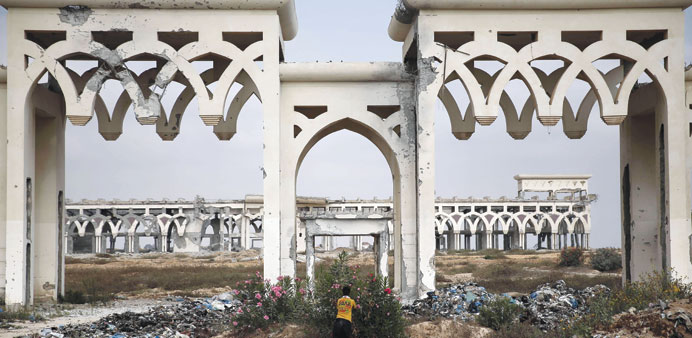By Harriet Sherwood/Guardian News & Media/Rafah
It was a powerful symbol of the Palestinian state that never was: Gaza international airport, opened in December 1998 with fanfare and red carpet by then US president Bill Clinton, and seen as a gateway to both the world and a better future.
Within a few years, as the second Palestinian Intifada, or uprising, took hold, Israel bombed first the control tower, then the runway, and finally the elegant Moroccan-designed terminal. Gaza’s airport is now a ruin in the desert, with a few squawking chickens pecking in the sand. The only sign of air traffic is the constant hum of overhead drones and the occasional roar of F16 fighter planes.
But in recent days, the airport - along with a seaport, never built despite 20 years of planning - has become a crucial sticking point in fraught negotiations between Israel and the Palestinians to agree terms on which to end this summer’s brutal war. Hamas demands both ports as entry and exit points for people and goods.
The airport - assigned the international code GZA, and later renamed Yasser Arafat international in honour of the Palestinian leader - opened at a cost of $86mn of international funding. It was the base of Palestinian Airways, whose three planes flew daily to Cyprus, Turkey, Egypt, Jordan, Syria and MorocCo
Fathi Sabbagh, a Gaza journalist for the Arab newspaper Al Hayat, was on the inaugural flight to Larnaca. “It was a small plane, a Fokker, and a bit shaky,” he recalled. “It was like an old van with wings. And we were a bit worried about the pilot, whether he was properly qualified.”
The 45-minute flight was uneventful, with three cabin crew serving refreshments in the brief moments between ascent and descent. “I was 39, and this was the first time I had flown on a Palestinian plane out of Gaza,” said Sabbagh. “That moment felt like an honour. When Israel destroyed the airport, a dream vanished.”
After that, as Israel’s blockade of Gaza tightened, local scavengers chipped away at what remained of the runway’s tarmac and hardcore to recycle as construction materials. Just over two weeks ago, Israeli tanks tore over the ruins during a battle centred on the nearby town of Rafah.
The opening of Gaza’s airport was permitted under the 1993 Oslo accords. But Israel did not relinquish control. Passengers had to be ferried to the nearby crossing between Gaza and Egypt, then under Israeli control, to have their passports stamped by Israeli officials. Nevertheless, said Sabbagh, the airport represented “a step towards having an independent Palestinian state”.
The Oslo accords also permitted the construction of a seaport in Gaza. In the late 1990s, a $73mn contract was signed with European partners. The second Intifada put paid to that, too, as Israeli tanks and bulldozers razed early work on the site, just south of Gaza City.
But Ziad Obaid, a civil engineer who has devoted the past 17 years of his career to the project, is once again hopeful that his dream of a bustling trade port could become a reality. “Gaza has been under tight siege for seven years - our only window is to the sea,” said the director general of the seaports authority.
However, Israel maintains a sea blockade on Gaza too, with warships patrolling the horizon, forbidding any boats from travelling beyond a highly-restricted fishing zone.
According to Obaid, who has a full-time staff of 20 working on the project, a seaport and docks would allow Palestinian traders to import and export goods and materials, thus boosting Gaza’s devastated economy.
“It would create thousands of jobs, and save millions of dollars,” he said. The cost to Gaza’s businesses of importing via Israel was estimated at $200m annually in 2000. Since then, he said, the scale of import requirements had increased at least five-fold.
A sea crossing to Cyprus would take about six hours. Other destinations could include Port Said and Alexandria in Egypt. A seaport in Gaza could also serve the landlocked West Bank and even Jordan, said Obaid.
“We have a design for safe passage (across Israeli territory), and we have accepted the need for external monitoring - technology can solve all the security concerns. But everything is stuck on the need for Israeli agreement.”
There is little sign of that. The Egyptian brokers of the talks between Israel and the Palestinian factions to end the war in Gaza have suggested that the airport and seaport demands be deferred for a second round of negotiations in about a month, assuming that the current round produces a definitive and agreed end to the current conflict.
Israel says that any deal for a seaport and airport must be linked to the disarmament of resistance groups in Gaza.
Palestinian negotiators say a seaport and airport would transform Gaza’s economy and give its people urgently needed routes to the outside world. “It’s a dream not just for me, but for all Palestinians,” said Obaid.

A boy picks flowers in front of the destroyed and deserted main gate of the Gaza strips’ former international airport.
